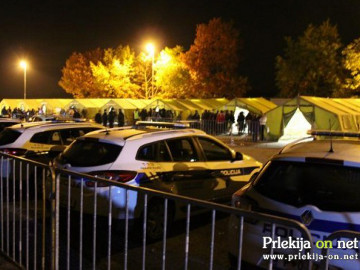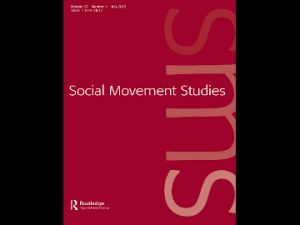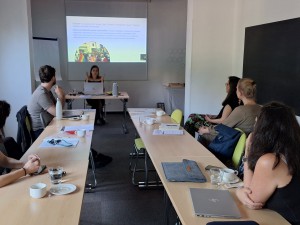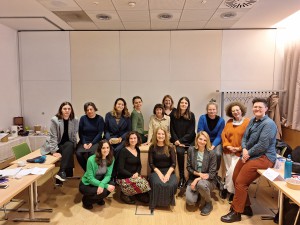Report from Središče ob Dravi
22. 10. 2015 | Human Rights and Minorities

On Tuesday, October 20th, 2015, we were in Središče ob Dravi. Around 7 pm, the train arrived from Čakovec with at least 1.500 people to the railway station, which is a good kilometre away from the reception and registration center. The key task was to immediately inform people (through the train windows) concerning the situation and the procedure to be followed. Initially, people didn’t understand where they are, why aren’t they allowed to get off the train, how long they will be waiting and what are they waiting for. When this information was provided with the help of the interpreters, people were somewhat calmer.
Buses were provided to take people to the reception centres for registration, but there weren’t enough of them for everyone, so people that were in the rear wagons had to wait for more than six hours on the train. Some wagons didn’t have lights, ventilation system was out of order and on top of it, windows could not be opened. In such conditions, some people became sick. We were able to make an arrangement with the police to allow some people (elderly, sick, pregnant women, families with young children) who needed medical attention and were not able to further endure waiting to get off the train. When first few wagons emptied and people were able to relocate, waiting for the buses became a little more bearable. The first group of buses took 400 people to register to Središče ob Dravi, another 400 to Petišovci and Dolga Vas, and then to Gruškovje. Initially, police had to be constantly reminded not to separate families and to ensure that they all went to the same bus (especially since not all buses were headed to the same reception centre). With the next group of buses, this started to function much better and in cooperation with police and translators, who were indispensable, we ensured families were not being separated. Despite the cooperation of the police, due to lack of buses at least 500 people had been waiting on that train for more than six hours. There was no help provided, not even water. Responding to our initiative, Slovenian Red Cross eventually brought water, but there was no food until at least midnight. People on the train told us that they didn’t get any food whole way through Croatia and they hadn’t eaten for more than 12 hours.
In the reception center in Središče ob Dravi with capacity for 400 people, registration process lasted until late night/morning hours. Families had the priority and they were able to wait for registration inside of tents where they were warm. During registration, police was also taking fingerprints. There were Civil protection, Red Cross, Slovene Philanthropy and UNHCR representatives, two small groups of volunteers from Switzerland, Germany and other countries and some individuals from Središče ob Dravi there. Red Cross provided water, apples and some dry food. Until that day there was no tea or hot water provided. We took the initiative and talked to representatives of the Civil protection, Red Cross and to the mayor of the municipality that afternoon and after that tea was also provided to the people in the centre, which was very important on a cold night as such. Volunteers from abroad were distributing clothes, but they didn’t have enough for everyone. Late in the evening they brought warm food and police allowed them to distribute it within the centre to those who have already been registered. Again, this was very welcome.
Both, at the reception centre and the railway station, more translators were needed, as they often played a key role. Ministry of the Interior had only two translators, namely for Arab and Farsi language. There were four more translators enlisted by the UNHCR who were really indispensable at both locations.
There was also a larger number of volunteers needed, to inform people and to monitor the registration process, as well as situation in general, especially at night.
Greater sense of initiative coming from Red Cross and Civil protection would have been very welcome – e.g. to provide hot drinks, hot water and hot food because there is nothing warm in the reception centres where people are held overnight. Once they come to accommodation centres, where hot food and beverages are available, people don’t stay there as they want to continue to Austria as soon as possible. Therefore, it would make more sense to adapt the current system and provide more (hot) food at reception centres. Help is also needed outside the reception centres, in this case at the railway station, where people are waiting for a long time.
Volunteers quickly ran out of warm clothes and especially shoes (children, women and men). More material help is needed, especially blankets and winter clothing and footwear.
The establishment of WiFi hotspots and providing chargers and SIM cards would be highly appreciated.
There were no major problems at Središče ob Dravi. The reason for that is probably the fact that the centre is relatively small, therefore providing enough space for all. Also, the police was informed about and prepared for the arrival of the refugees by train.




